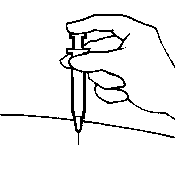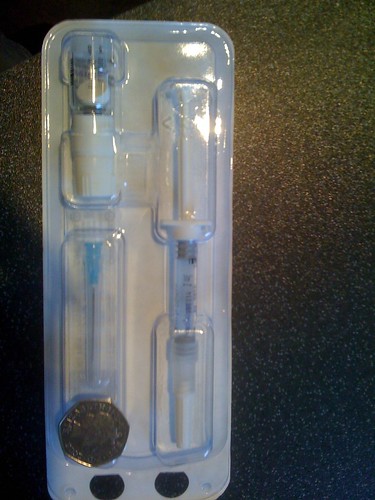I could sleep for a thousand years...
The purpose of this drug is to try and prevent my immune system from causing any more damage to my nervous system, thus slowing down the onset of disability as my multiple sclerosis advances. The evidence that it works isn't exactly overwhelming, but I'm of the opinion that it's better to try something that might work than to do nothing at all. Not everyone with MS agrees, and lots of people find that they would rather take the chance of the increased relapses by doing nothing than of continuing to live with the side-effects of the drug.
The side-effects vary from person to person, but include things like pounding headaches, shivering, a raised temperature, sweats and other flu-like symptoms. The long-term use of the drug can also damage liver function and cause other blood abnormalities, as well as the more immediate problem of injection site issues where you stick the bloody great needle into your leg. Yeah, it's easy to see why some people decide that it's not worth it... but luckily for me, I seem to be relatively unaffected: my red blood count has been dropping and I'm now slightly anaemic, but my liver seems to be okay, and as long as I remember to take the ibuprofen and paracetamol before I inject, I'm not really bothered by headaches or anything like that (although the one time I did forget, I woke up in the middle of the night with the most incredible pounding in my head, so I'm certainly not in a hurry to forget again).
One side-effect I do experience is that I usually wake up on a Wednesday morning completely devoid of energy. I wake up most days now with very little feeling in the soles of my feet, and have to get out of bed very carefully, but on a Wednesday I struggle to get out of bed at all: I feel as though all of the strength has been sapped from my muscles and I'm weary down to my bones. The main reason I go for a run on a Tuesday night is that I know there's a good chance I won't want to do anything of the sort on a Wednesday. Too much like hard work. Wednesday has become my default (and reluctant) rest day.
This morning I dragged myself out of bed, forced myself to do the strengthening exercises -- that I do every Monday, Wednesday and Friday -- that are helping to stop muscle wastage across my arms and shoulders and got ready for another depressing day at work. The weather was pretty grim, so I think it's fair to say that I didn't exactly have a spring in my step as I left the house.
My energy levels - both physical and mental - are definitely at their lowest on a Wednesday morning. If there is a time of the week when I need a lift, then Wednesday morning is definitely that time. Luckily for me though, that is exactly the time of the week - in term time at least - when I usually receive exactly the boost required: I don't go directly to work on a Wednesday morning, I stop instead at a local primary school to help out with their reading. I often say that it's probably the most valuable hour of my working week, thinking of the kids, but I'm beginning to realise how much of a difference that hour makes to me too.
This morning, I walked into an almost empty classroom to be greeted by the warmest of smiles and a cheery "Good morning Tim!" from a charming seven year-old called Chloe.
It is, I reckon, impossible to feel too sorry for yourself after that.
Labels: WTs
















